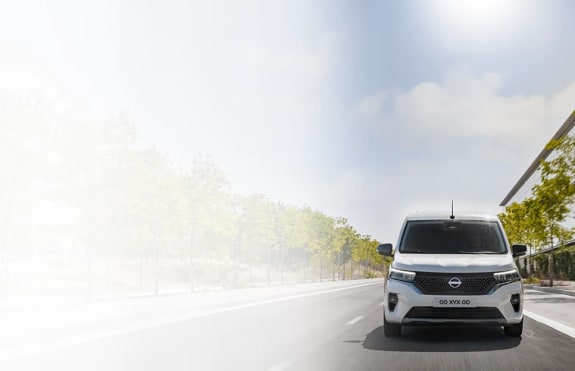
Electric Van Lease Deals
Making the switch to electric vans is easier than ever before. With more models to choose from, wider charging options and lower running costs, there’s little reason for your business to resist the charge of electrification.
Electric Van Leasing FAQs
Absolutely. For smaller vans with a gross vehicle weight below 2,500kg, the government will step in and cover 35% of the purchase price, up to a maximum of £3,000. For larger vans, that extends to £6,000. These grants reduce your lease payments, meaning usually expensive electric options can end up being cheaper than more traditionally-powered models.
Most will plug into a standard three-pin socket, but that’s a slow and tedious way of topping up your van. A dedicated charger for your home or yard will make overnight charges simple, cheap and easy, and these can be installed for very little - and are often free. On the road, rapid chargers simply plug in as easily as you’d pump diesel, although there are an array of payment options. Most accept simple contactless card payments (or will do soon) though.
This depends on the size of the battery pack, but even the largest - currently the 75kWh van family from Citroen, Peugeot, Toyota and Vauxhall, can take an 80% charge in just 45 minutes, enough for another 164 miles of motoring.
As a general rule, the larger the battery pack, the longer the range. Batteries are measured in kilowatt-hours (kWh) with the 37.3kWh Volkswagen ABT e-Transporter having an official range of just 83 miles, against the 75kWh Vauxhall Vivaro-e’s 205 miles.
Generally, yes. There are far fewer things to go wrong, so servicing is often cheaper and quicker, keeping you on the road for longer. Tax savings can be significant, and every electric van avoids being clobbered by congestion charges and low emission zone fees. Of course, electricity is also far cheaper than diesel - even an expensive home tariff will see your fuel bills cut by more than half. Expect to pay around 5p per mile covered.
Every electric van operates like an automatic, although technically there aren’t any gears at all - the electric motor simply spins faster if you want to go more quickly.
Yes. Most electric vans are rated for towing, with some able to pull loads as heavy as a tonne.
Benefits of Electric Van Leasing

Affordable electricity costs
Fuel costs, in the form of electricity, should be around a tenth of the cost of diesel, saving a fortune for owner-operators and fleets alike.

EXEMPT FROM CONGESTION CHARGES
Zero emissions mean any electric van is exempt from the increasing number of low emission zones or congestion charge areas in cities around the country.

SIMPLE & LOW COST MAINTENANCE
Low maintenance costs and simple repairs will keep your van on the road for longer and with less expenditure.

RELAXING DRIVING EXPERIENCE
Instant power and no gear changes make for a relaxing driving experience, with the near-silent operation reducing driver fatigue and improving safety.
Want to know more about electric van leasing deals? Get in touch now with our dedicated leasing consultants on
0118 338 3799 or email us at enquiries@selectcarleasing.co.uk
An Introduction To Electric Vans
The UK is a prime target for electric van manufacturers, thanks to an explosion in demand and an island that is compact enough to keep most journeys within the limits of the battery pack.
There’s never been a wider range of models to lease, from city-friendly super compact vans like the Renault Zoe to fully-fledged 3.5-tonne favourites such as the Mercedes-Benz eSprinter and Vauxhall Movano. And, thanks to some clever design, there’s no need to compromise on load-lugging ability, with battery-powered vans being every bit as capable as their fossil fuelled brethren.
As well as being more environmentally friendly, the total cost of ownership of many electric vans is lower than their diesel-powered counterparts too, while your vehicle will be exempt from ULEZ and congestion charges, further lowering your businesses overheads and improving margins.
To be eligible for one of our offers you will need to be over 18 and approved for credit with one of our verified lenders. • Not every applicant may be eligible. • Information and prices are correct at the time of publishing which is subject to change. • All vehicles listed are subject to manufacturing availability. • All data listed comes from CAP database and subject to change. • All offers are subject to availability/change and may be withdrawn at any time without prior notice. • Failure to maintain payments may result in the termination of your contract agreement and the vehicle being returned. • All vehicles images and descriptions are for illustration and reference purposes only. • Please visit the manufacturer's website for more accurate specification. • Terms and conditions apply. • Please be aware that you do not own the vehicle at the end of the contract. • The finance company/funder does not allow and do not sign up to support the activation of In-car Connected services within all vehicles (there may be exceptions to this - please enquire).
![L2 90kW Acenta Van Auto 45kWh [2023]](https://cdn.imagin.studio/getImage?customer=selectcarleasing&angle=1&aspectRatio=1.76&countryCode=GB&fileType=webp&groundPlaneAdjustment=0.0&make=NISSAN&modelFamily=Townstar%20EV&modelRange=Small%20Van&modelVariant=van&modelYear=2023&paintDescription=Metallic%20-%20Enigma%20black&paintId=26281&powerTrain=Electric&transmission=Automatic&trim=Acenta&width=440&zoomLevel=70)
![CARGO 210kW Commerce 79kWh Auto [2025]](https://cdn.imagin.studio/getImage?customer=selectcarleasing&angle=1&aspectRatio=1.76&countryCode=GB&fileType=webp&groundPlaneAdjustment=0.0&make=VOLKSWAGEN&modelFamily=ID.BUZZ&modelRange=ID.BUZZ%20CARGO&modelVariant=van&modelYear=2025&paintDescription=Metallic%20-%20Bay%20leaf%20green&paintId=18947&powerTrain=Electric&transmission=Automatic&trim=CARGO&width=440&zoomLevel=70)
![130kW Double Cab Pickup 88.5kWh Auto [2022]](https://cdn.imagin.studio/getImage?customer=selectcarleasing&angle=1&aspectRatio=1.76&countryCode=GB&fileType=webp&groundPlaneAdjustment=0.0&make=MAXUS&modelFamily=T90&modelRange=T90&modelVariant=van&modelYear=2022&paintDescription=T90%20Colour%20pack%20metallic%20-%20Metal%20black&paintId=26668&powerTrain=Electric&transmission=Automatic&trim=default&width=440&zoomLevel=70)
![T32 SWB 100kW 83kWh Commerce Pro Van Auto [2025]](https://cdn.imagin.studio/getImage?customer=selectcarleasing&angle=1&aspectRatio=1.76&countryCode=GB&fileType=webp&groundPlaneAdjustment=0.0&make=VOLKSWAGEN&modelFamily=e-Transporter&modelRange=Medium%20Van&modelVariant=van&modelYear=2025&powerTrain=Electric&transmission=Automatic&trim=T32%20SWB&width=440&zoomLevel=70)
![L2 E-TECH LL21 90kW 44kWh Advance [Safety] Van Auto [2024]](https://cdn.imagin.studio/getImage?customer=selectcarleasing&angle=1&aspectRatio=1.76&countryCode=GB&fileType=webp&groundPlaneAdjustment=0.0&make=RENAULT&modelFamily=Kangoo%20E-Tech&modelRange=Small%20Van&modelVariant=van&modelYear=2024&paintDescription=Solid%20-%20Mineral%20white&paintId=11374&powerTrain=Electric&transmission=Automatic&trim=L2%20E-TECH&width=440&zoomLevel=70)
![1.8 VVT-i Hybrid Commercial Auto [2024]](https://cdn.imagin.studio/getImage?customer=selectcarleasing&angle=1&aspectRatio=1.76&countryCode=GB&fileType=webp&groundPlaneAdjustment=0.0&make=TOYOTA&modelFamily=Corolla%20Commercial&modelRange=Small%20Van&modelVariant=van&modelYear=2024&paintDescription=Metallic%20-%20Decuma%20grey&paintId=12643&powerTrain=Hybrid&transmission=Automatic&trim=default&width=440&zoomLevel=70)
![CADDY CARGO MAXI C20 1.5 TSI eHybrid 150 Commerce Van DSG [Bus/Tech] [2025]](https://cdn.imagin.studio/getImage?customer=selectcarleasing&angle=1&aspectRatio=1.76&countryCode=GB&fileType=webp&groundPlaneAdjustment=0.0&make=VOLKSWAGEN&modelFamily=CADDY&modelRange=CADDY%20SMALL%20VAN&modelVariant=van&modelYear=2025&paintDescription=Metallic%20-%20Indium%20grey&paintId=12859&powerTrain=Plug-in%20Hybrid&transmission=Automatic&trim=CADDY%20CARGO%20MAXI%20C20&width=440&zoomLevel=70)
![L1 E-TECH ML19 90kW 44kWh Advance [Safety] Van Auto [2024]](https://cdn.imagin.studio/getImage?customer=selectcarleasing&angle=1&aspectRatio=1.76&countryCode=GB&fileType=webp&groundPlaneAdjustment=0.0&make=RENAULT&modelFamily=Kangoo%20E-Tech&modelRange=Small%20Van&modelVariant=van&modelYear=2024&paintDescription=Solid%20-%20Mineral%20white&paintId=11374&powerTrain=Electric&transmission=Automatic&trim=L1%20E-TECH&width=440&zoomLevel=70)
![E- 350 L3 RWD 135kW 68kWh H2 Leader Van Auto [2025.5]](https://cdn.imagin.studio/getImage?customer=selectcarleasing&angle=1&aspectRatio=1.76&countryCode=GB&fileType=webp&groundPlaneAdjustment=0.0&make=FORD&modelFamily=E-Transit&modelRange=Large%20Van&modelVariant=van&modelYear=2025&paintDescription=SVO%20Special%20solid%20-%20Saffron%20yellow&paintId=19455&powerTrain=Electric&transmission=Automatic&trim=350%20L3%20RWD&width=440&zoomLevel=70)
![E- 350 L2 RWD 135kW 68kWh H2 Trend Van Auto [2025.5]](https://cdn.imagin.studio/getImage?customer=selectcarleasing&angle=1&aspectRatio=1.76&countryCode=GB&fileType=webp&groundPlaneAdjustment=0.0&make=FORD&modelFamily=E-Transit&modelRange=Large%20Van&modelVariant=van&modelYear=2025&paintDescription=SVO%20Special%20solid%20-%20Saffron%20yellow&paintId=19455&powerTrain=Electric&transmission=Automatic&trim=350%20L2%20RWD&width=440&zoomLevel=70)
![L2 90kW Acenta Van Auto 45kWh [2024.5]](https://cdn.imagin.studio/getImage?customer=selectcarleasing&angle=1&aspectRatio=1.76&countryCode=GB&fileType=webp&groundPlaneAdjustment=0.0&make=NISSAN&modelFamily=Townstar%20EV&modelRange=Small%20Van&modelVariant=van&modelYear=2024&paintDescription=Metallic%20-%20Enigma%20black&paintId=26281&powerTrain=Electric&transmission=Automatic&trim=Acenta&width=440&zoomLevel=70)
![Pick Up D/Cab Wildtrak 2.3 EcoBoost PHEV 281 Auto [2025.75]](https://cdn.imagin.studio/getImage?customer=selectcarleasing&angle=1&aspectRatio=1.76&countryCode=GB&fileType=webp&groundPlaneAdjustment=0.0&make=ford&modelFamily=ranger&modelRange=wildtrak&modelVariant=van&modelYear=2025&paintDescription=Metallic%20-%20Cyber%20orange&paintId=26022&powerTrain=Plug-in%20Hybrid&transmission=Automatic&trim=default&width=440&zoomLevel=70)
![Pick Up D/Cab Stormtrak 2.3 EcoBoost PHEV 281 Auto [2025.75]](https://cdn.imagin.studio/getImage?customer=selectcarleasing&angle=1&aspectRatio=1.76&countryCode=GB&fileType=webp&groundPlaneAdjustment=0.0&make=FORD&modelFamily=RANGER&modelRange=RANGER%20PICK-UP&modelVariant=van&modelYear=2025&paintDescription=Metallic%20-%20Cyber%20orange&paintId=26022&powerTrain=Plug-in%20Hybrid&transmission=Automatic&trim=default&width=440&zoomLevel=70)
![E- 320 L1 RWD 100kW 65kWh H1 Van Limited Auto [2025.25]](https://cdn.imagin.studio/getImage?customer=selectcarleasing&angle=1&aspectRatio=1.76&countryCode=GB&fileType=webp&groundPlaneAdjustment=0.0&make=FORD&modelFamily=E-Transit%20Custom&modelRange=Medium%20Van&modelVariant=van&modelYear=2025&paintDescription=Metallic%20-%20Digital%20blue%20aqua&paintId=27766&powerTrain=Electric&transmission=Automatic&trim=320%20L1%20RWD&width=440&zoomLevel=70)













